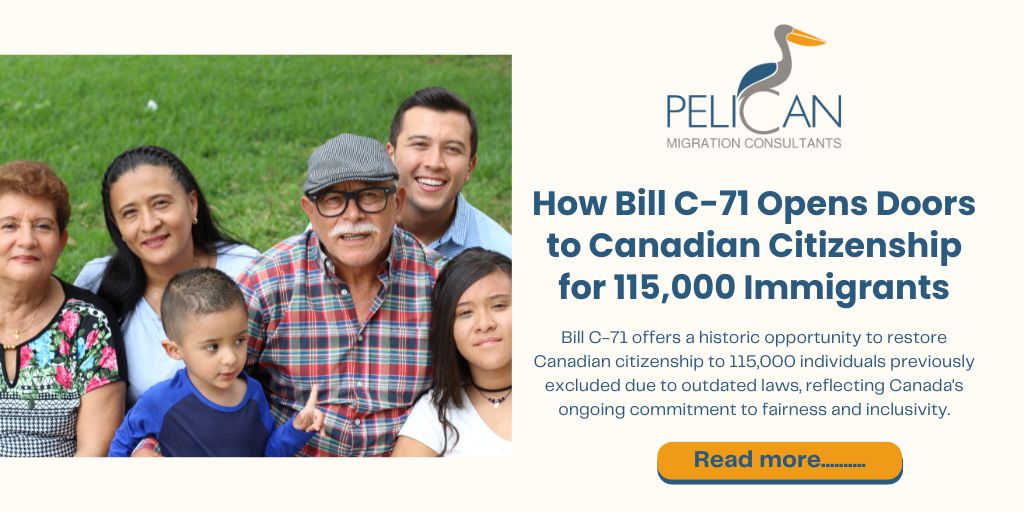
Canada’s ongoing commitment to diversity, fairness, and inclusivity is underscored by the introduction of Bill C-71, a landmark piece of legislation that aims to restore Canadian citizenship to individuals who were historically excluded under previous laws. This bill addresses a long-standing issue for a group known as "Lost Canadians," a term that refers to individuals with a direct connection to Canada but who were unable to claim citizenship due to technicalities in the law. Bill C-71 offers an opportunity to grant Canadian citizenship to approximately 115,000 people, and in doing so, Canada reaffirms its values of multiculturalism, equality, and social justice.
Understanding Bill C-71 and Its Purpose
Bill C-71 was introduced to amend the Canadian Citizenship Act, with the goal of reinstating the rights of individuals who were previously excluded from Canadian citizenship due to changes made to the law in 2009. In that year, the Conservative government enacted a policy that limited citizenship rights to only the first generation born abroad to Canadian parents. This policy, which aimed to prevent so-called “Canadians of convenience,” unintentionally left out many individuals who had strong connections to Canada.
Among the groups affected were:
- Children of Canadians who were working abroad at the time of their birth.
- Indigenous children born in cross-border communities.
- Children, or "border babies," born just across the U.S. border.
For these individuals, the loss of citizenship meant that they could not pass down Canadian citizenship to their children, even though they considered themselves Canadians. Bill C-71 works to reverse this by extending citizenship rights to these affected individuals, often referred to as Lost Canadians.
Who Are the Lost Canadians?
The term "Lost Canadians" refers to individuals who are connected to Canada but were excluded from citizenship due to technicalities in the Citizenship Act. These individuals are Canadian by descent but were unable to claim citizenship due to restrictive laws. Examples of Lost Canadians include:
- Children born between February 15, 1977, and April 17, 1981: These were children born to Canadian parents who themselves lost their Canadian citizenship upon turning 28 years old. Despite having Canadian parents, they were excluded from citizenship due to generational limits.
- Descendants of Canadians: In some cases, individuals who had Canadian ancestors but were born abroad were unable to pass on their Canadian citizenship because the law didn’t allow citizenship to be passed beyond one generation.
- Adoptees of Canadian citizens living abroad: These individuals often grew up in Canada, identified as Canadians, but found that their adoption did not allow them to claim citizenship.
For many of these individuals, the denial of Canadian citizenship has led to barriers when seeking passports, healthcare, education, or employment opportunities in Canada.
What Does the Parliamentary Budget Officer’s Report Say?
According to the report from the Parliamentary Budget Officer (PBO), Bill C-71 has the potential to grant Canadian citizenship to about 115,000 individuals within the next five years. The estimated cost for implementing this change is $20.8 million, with the majority of the expenditures expected to occur in the 2025-2026 fiscal year.
The report highlights the following:
- The estimated 115,000 individuals who could be granted citizenship includes descendants, adoptees, and those affected by the generational restrictions.
- Although the numbers seem significant, it’s expected that not all eligible individuals will choose to apply for citizenship.
- The cost breakdown includes application processing and outreach campaigns to ensure those eligible are informed about their rights.
How Will This Impact Canada?
Bill C-71’s potential to grant citizenship to 115,000 Lost Canadians carries with it several significant implications for both individuals and Canadian society at large. By restoring citizenship to these individuals, Canada is not only righting historical wrongs but also reasserting its commitment to the principles of inclusion and diversity. Some key anticipated benefits of this bill include:
- Strengthened Communities: Many of the Lost Canadians already reside in Canada. By granting them citizenship, Canada reinforces their sense of belonging and ensures they can fully enjoy the rights and privileges of citizenship, including access to healthcare, education, and social services.
- Global Reach: Granting citizenship to individuals abroad strengthens Canada’s global ties. Many of these individuals have established lives in other countries, and by offering them citizenship, Canada solidifies its role as a global leader in immigration and human rights.
- Cultural Inclusion: The bill also acknowledges the unique cultural contributions of Indigenous communities and those in cross-border areas. It ensures fairness and reflects Canada's core values of multiculturalism, which is a vital part of the nation’s identity.
- Economic Growth: By allowing more individuals to participate fully in Canadian society, this bill could contribute to Canada’s economic growth. It strengthens the workforce and enriches Canadian culture with the inclusion of diverse perspectives and experiences.
- Legal Resolution: For many individuals who grew up identifying as Canadian, the bill offers a long-awaited resolution to a deeply felt injustice. The restoration of their citizenship offers more than just a legal status change—it provides them with a renewed sense of belonging.
Challenges and Opportunities
While Bill C-71 presents an opportunity to right past wrongs, there are still challenges that must be addressed. Among the hurdles are the complexity of the application process, the need for widespread awareness campaigns, and potential bureaucratic delays in processing applications. These challenges could limit how many eligible individuals apply for citizenship, although the legislation lays a strong foundation for future reforms.
Advocates for the Lost Canadians, such as Don Chapman, emphasize that many eligible individuals may choose not to apply, either due to lack of awareness or the complexity of the process. Nevertheless, the passage of Bill C-71 is a significant step forward in ensuring that Canada remains a beacon of fairness and equality.
How Pelican Migration Consultants Can Help
Pelican Migration Consultants, with its extensive experience in immigration services, is well-positioned to assist individuals affected by Bill C-71 in navigating the citizenship application process. Here are five ways Pelican Migration Consultants can provide support:
- Expert Guidance on Eligibility: Pelican Migration Consultants can assess whether you qualify for Canadian citizenship under Bill C-71 and explain the nuances of the law. This is especially important given the complexity of the application process.
- Document Collection and Preparation: Gathering the necessary documents can be a daunting task. Pelican’s experts will help you compile and organize all required documents for your citizenship application.
- Application Assistance: The application process can be intricate, but Pelican Migration Consultants ensures that your application is submitted correctly and on time, increasing your chances of approval.
- Representation and Advocacy: As experts in Canadian immigration law, Pelican can represent you in communications with the Canadian authorities, ensuring that your case is presented effectively and efficiently.
- Post-Application Support: After submitting your application, Pelican will provide ongoing support, keeping you informed about the status of your application and addressing any issues that may arise.
Frequently Asked Questions (FAQs)
- Who qualifies for citizenship under Bill C-71? Bill C-71 applies to individuals who were excluded from Canadian citizenship due to generational limits, such as children born abroad to Canadian parents or Indigenous individuals born in cross-border communities.
- How can I apply for citizenship under Bill C-71? You can apply by completing the citizenship application form and providing relevant documents that prove your Canadian descent or connection to Canada.
- Will everyone eligible under Bill C-71 apply for citizenship? While the bill estimates 115,000 eligible individuals, it is expected that not all will apply due to various reasons, such as lack of awareness or personal circumstances.
- How long will it take to process my application? Processing times can vary depending on the complexity of the case, but Pelican Migration Consultants will help expedite the process by ensuring your application is completed accurately.
- Can Pelican Migration Consultants assist me in this process? Yes, Pelican Migration Consultants specializes in assisting clients with Canadian citizenship applications, providing expert advice and comprehensive support throughout the entire process.
In conclusion, Bill C-71 represents a significant step towards correcting past injustices and providing Canadian citizenship to thousands of people who were once excluded. By addressing this historical inequity, Canada not only reaffirms its values of inclusivity but also strengthens its commitment to multiculturalism and fairness. Pelican Migration Consultants is ready to guide you through this process, ensuring that you receive the citizenship you deserve.


